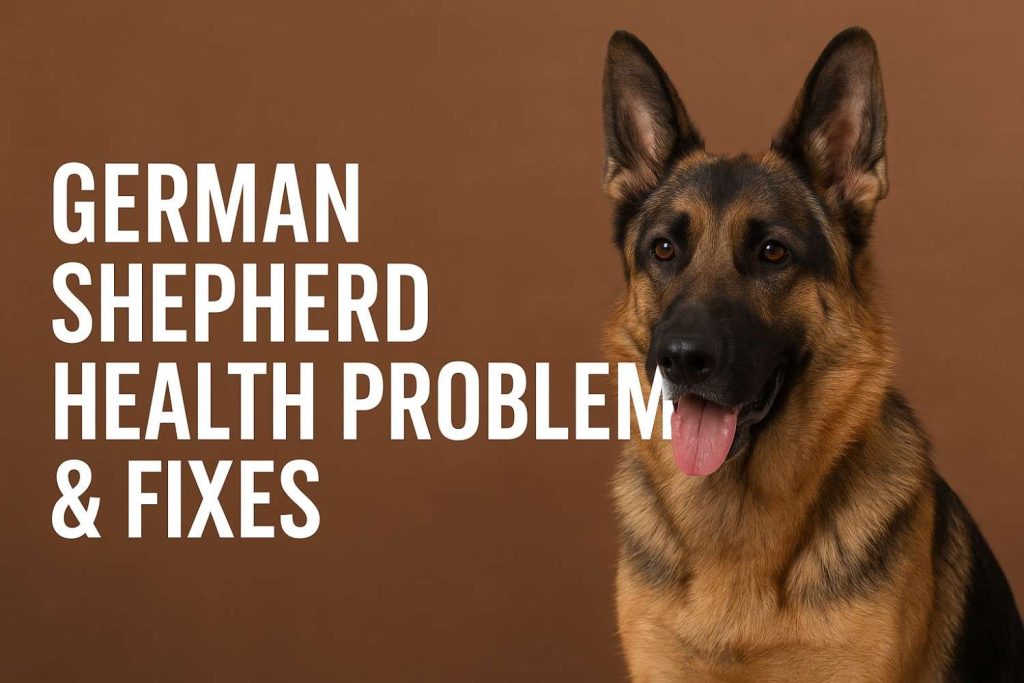German Shepherds are one of the most loved dog breeds in the world. They are loyal, brave, and highly intelligent, which makes them great family companions and working dogs. However, like every breed, they face a few common health issues. Because of this, it is very important for owners to know the early signs and the best prevention tips.
In this complete guide, you will learn about the most common German Shepherd health problems and the simple steps you can take to keep your dog healthy and active for years.

1. Hip and Elbow Dysplasia
Hip and elbow dysplasia are the most common issues found in German Shepherds. Basically, these are joint problems where the bones do not fit together properly. As a result, the dog may feel pain or find it hard to walk.
Symptoms
-
Trouble standing up
-
Slow walking or limping
-
Less interest in playing
-
Difficulty climbing stairs
Fixes
-
Keep your dog at a healthy weight
-
Give joint supplements like glucosamine
-
Provide gentle exercise like walking or swimming
-
Use orthopedic dog beds
-
Visit your vet for X-rays and treatment options
Overall, early detection helps reduce pain and improves mobility.
2. Degenerative Myelopathy
Degenerative Myelopathy is a progressive spinal cord condition. In the beginning, dogs may show signs similar to weakness or dragging their back legs. Later, walking becomes difficult.
Symptoms
-
Dragging paws
-
Wobbly back legs
-
Difficulty standing
-
Weakness while walking
Fixes
-
Physiotherapy
-
Controlled exercise
-
Mobility support belts
-
Regular vet checkups
-
Supplements that support nerve function
Although there is no complete cure, early care helps slow the disease.
3. Digestive Issues
German Shepherds often have sensitive stomachs. Therefore, they may experience gas, loose stools, or indigestion. In many cases, the problem is due to food allergies or poor digestion.
Symptoms
-
Gas
-
Vomiting
-
Soft stools
-
Loss of appetite
Fixes
-
Switch to a high-quality dog food
-
Choose grain-free or hypoallergenic diets
-
Feed smaller, frequent meals
-
Add probiotics for gut health
-
Monitor any food allergy triggers
With consistency, digestive issues become easy to manage.
4. Skin Allergies
Skin problems are very common in this breed. Often, they develop allergies due to food, dust, fleas, or even weather changes. Because of these triggers, your dog may scratch more than usual.
Symptoms
-
Itching
-
Red patches
-
Hair loss
-
Dry skin
-
Hot spots
Fixes
-
Use vet-approved anti-allergy shampoos
-
Clean bedding regularly
-
Give omega-3 supplements
-
Check for fleas and ticks often
-
Provide hypoallergenic food if required
By addressing the root cause, most skin issues improve quickly.
5. Ear Infections
German Shepherds have large, upright ears. However, these ears can trap dirt and moisture, which leads to infections. As a result, dogs may shake their heads often or scratch their ears.
Symptoms
-
Bad smell from the ear
-
Redness
-
Discharge
-
Frequent head shaking
Fixes
-
Clean ears weekly
-
Keep ears dry after baths
-
Visit the vet if infection persists
-
Use ear-cleaning solutions recommended by vets
Regular cleaning is the best prevention.
6. Bloat (Gastric Dilatation Volvulus)
Bloat is a very serious condition. In simple terms, the stomach fills with gas and twists. Because of this, it becomes a medical emergency.
Symptoms
-
Swollen belly
-
Restlessness
-
Drooling
-
Trying to vomit but nothing comes out
Fixes
-
Feed two or three small meals instead of one large meal
-
Avoid exercise right after eating
-
Use slow-feeder bowls
-
Seek immediate vet help if symptoms appear
Quick action can save your dog’s life.
7. Exocrine Pancreatic Insufficiency (EPI)
German Shepherds are more prone to EPI than many other breeds. Basically, the pancreas does not produce enough digestive enzymes. Because of this, food is not digested properly.
Symptoms
-
Weight loss
-
Large, soft stool
-
Constant hunger
-
Poor coat condition
Fixes
-
Enzyme supplements (provided by your vet)
-
High-quality, easy-to-digest food
-
Regular monitoring of stool and eating habits
Thankfully, EPI can be managed well with consistent treatment.
8. Arthritis
As German Shepherds grow older, arthritis becomes common. Usually, it affects their joints and leads to stiffness. Eventually, movement becomes uncomfortable.
Symptoms
-
Difficulty getting up
-
Reduced activity
-
Stiff movements
-
Swollen joints
Fixes
-
Light daily exercise
-
Joint supplements
-
Warm and soft bedding
-
Anti-inflammatory medicines prescribed by the vet
With proper care, dogs stay active for much longer.
9. Eye Issues
Some German Shepherds develop eye problems such as cataracts or pannus. In many cases, these are related to genetics or sunlight exposure.
Symptoms
-
Cloudy eyes
-
Redness
-
Reduced vision
-
Watery eyes
Fixes
-
Regular eye checkups
-
UV-protective dog goggles for sunny areas
-
Vet-prescribed eye drops
Early detection helps prevent vision loss.
10. How to Keep Your German Shepherd Healthy (Simple Daily Tips)
To keep your dog healthy, follow these easy habits. Not only do they prevent problems, but they also improve overall well-being.
-
Provide daily exercise
-
Give a balanced diet
-
Brush the coat often
-
Keep ears, teeth, and nails clean
-
Maintain a healthy body weight
-
Schedule vet visits every 6–12 months
-
Provide mental stimulation with toys and training
Above all, stay observant. If you notice any unusual behavior, contact your vet.
Final Thoughts
German Shepherds are strong, intelligent, and loving dogs. Even though they face several common health challenges, most of these issues can be managed or prevented. By taking simple steps, you can make sure your dog stays healthy and happy throughout their life. In the end, early care, proper diet, and regular checkups are the best gifts you can give to your loyal companion.



